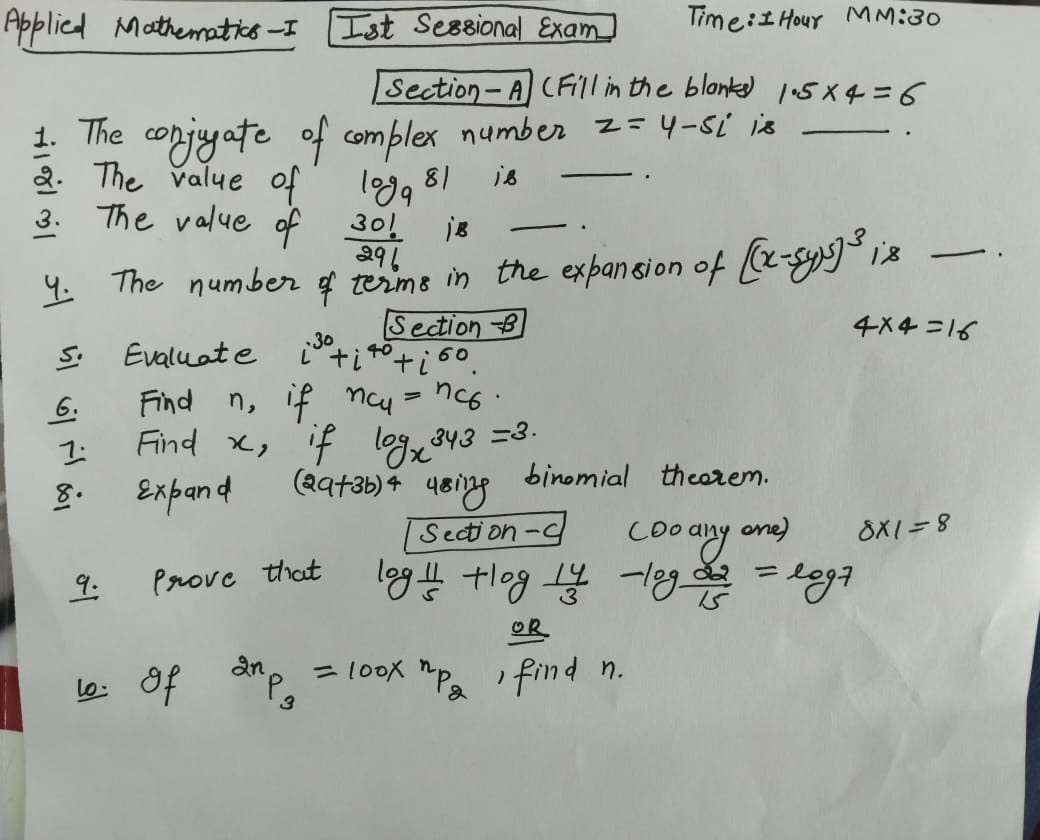1. The conjugate of complex number z = 4 - 5i is ___. 2. The value of log_2 81 is ___. 3. The value of 30! / 29! is ___. 4. The number of terms in the expansion of (x - y)^3 is ___... 1. The conjugate of complex number z = 4 - 5i is ___. 2. The value of log_2 81 is ___. 3. The value of 30! / 29! is ___. 4. The number of terms in the expansion of (x - y)^3 is ___. 5. Evaluate i^30 + i^40 + i^60. 6. Find n, if nC4 = nC6. 7. Find x, if log_x 343 = 3. 8. Expand (2a + 3b)^4 using binomial theorem. 9. Prove that log_5 (14/3) - log_5 (2/15) = log_5 7. 10. If 2nP3 = 100x nP2, find n.

Understand the Problem
The question is asking to evaluate several mathematical problems, including complex numbers, logarithms, and binomial expansions. The questions comprise a session exam with different sections focusing on fundamental concepts in mathematics.
Answer
1. $4 + 5i$ 2. $1.9084$ 3. $1.4771$ 4. $4$ 5. $1$ 6. $6 + u$ 7. $x = 7$ 8. Expand using binomial theorem for $(2a + 3b)^4$.
Answer for screen readers
- $4 + 5i$
- Approximately $1.9084$
- Approximately $1.4771$
- $4$
- $1$
- $6 + u$
- $x = 7$
- Expansion calculated as per binomial theorem.
Steps to Solve
- Finding the conjugate of a complex number
The conjugate of a complex number $z = a + bi$ is given by $z^* = a - bi$.
For $z = 4 - 5i$, the conjugate is: $$ z^* = 4 + 5i $$
- Calculating the logarithm value
To find $\log_{10} 81$, we can express 81 as a power of 10.
Since $81 = 3^4$, we have: $$ \log_{10} 81 = \log_{10} (3^4) = 4 \cdot \log_{10} 3 $$
Using a calculator, $\log_{10} 3 \approx 0.4771$, thus: $$ \log_{10} 81 \approx 4 \cdot 0.4771 \approx 1.9084 $$
- Calculating the logarithm value (base 3)
To find $30! / 29!$, we can simplify: $$ \frac{30!}{29!} = 30 $$
Now, we evaluate $\log_{10} 30$.
Using a calculator: $$ \log_{10} 30 \approx 1.4771 $$
- Finding the number of terms in the binomial expansion
In the expansion of $(x - y)^3$, the number of terms is given by $n + 1$, where $n$ is the power.
Thus, for $(x - y)^3$, we have: $$ 3 + 1 = 4 $$
- Evaluating the complex expression
For $i^{30} + i^{40} + i^{60}$, recall that $i^n$ cycles every 4 terms:
- $i^1 = i$
- $i^2 = -1$
- $i^3 = -i$
- $i^4 = 1$
Thus, we calculate:
- $30 \mod 4 = 2 \implies i^{30} = -1$
- $40 \mod 4 = 0 \implies i^{40} = 1$
- $60 \mod 4 = 0 \implies i^{60} = 1$
Combining these gives: $$ i^{30} + i^{40} + i^{60} = -1 + 1 + 1 = 1 $$
- Finding n in combinations
Given $nC_u = nC_6$, we can apply the property that $nC_k = nC_{n-k}$. Hence: $$ u = n - 6 $$
This leads us to find $n = 6 + u$.
- Finding x in logarithmic form
Given $\log_{3} 343 = 3$, we rewrite 343 as a power of 7: $$ 7^3 = 343 \implies \log_{3} (7^3) = 3 \log_{3} 7 = 3 $$
Thus: $$ \log_{3} 7 = 1 $$
- Expanding using binomial theorem
Using the binomial theorem to expand $(2a + 3b)^4$: $$ (2a + 3b)^4 = \sum_{k=0}^{4} \binom{4}{k} (2a)^{4-k} (3b)^{k} $$
Calculating the individual terms yields: $$ = \binom{4}{0}(2a)^4(3b)^0 + \binom{4}{1}(2a)^3(3b)^1 + \binom{4}{2}(2a)^2(3b)^2 + \binom{4}{3}(2a)^1(3b)^3 + \binom{4}{4}(2a)^0(3b)^4 $$
- $4 + 5i$
- Approximately $1.9084$
- Approximately $1.4771$
- $4$
- $1$
- $6 + u$
- $x = 7$
- Expansion calculated as per binomial theorem.
More Information
The answers cover various fundamental concepts in mathematics, including complex numbers, logarithms, and the binomial theorem, all essential for deeper understanding in advanced math.
Tips
- Complex Conjugate Confusion: Forgetting the sign change when finding conjugates.
- Logarithm Calculation Errors: Misunderstanding bases can lead to incorrect results.
- Binomial Expansion Errors: Missing terms in expansions or incorrect application of coefficients.
AI-generated content may contain errors. Please verify critical information